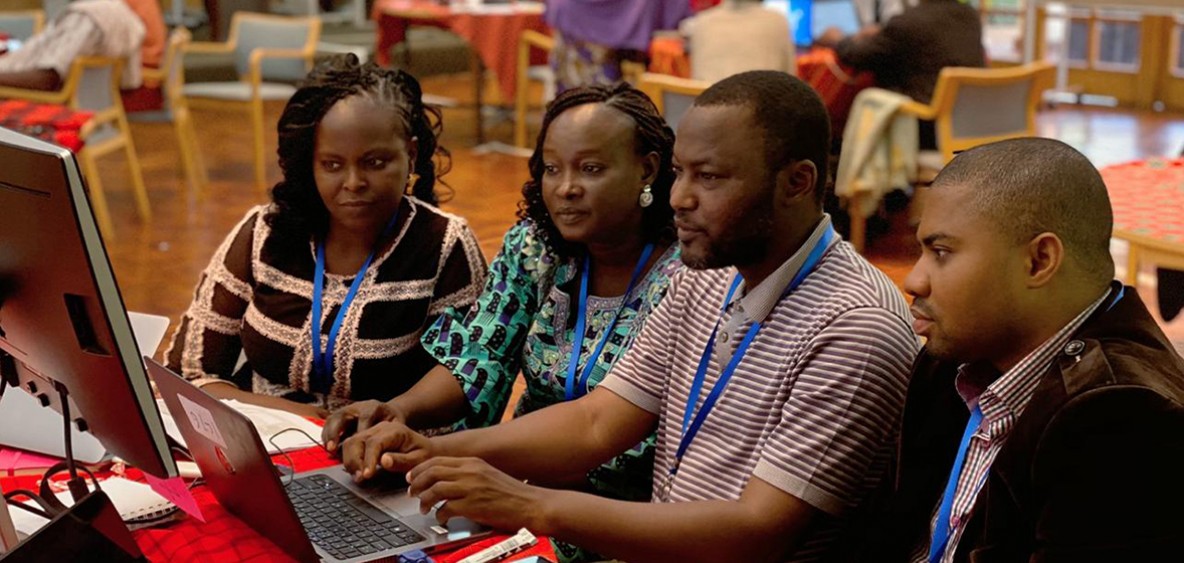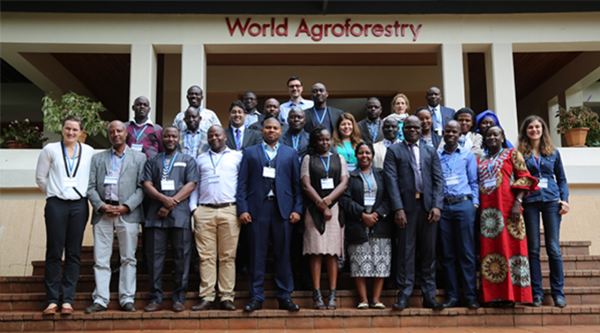
A Monitoring & Evaluation workshop was held at the World Agroforestry campus in Nairobi to consolidate the collective M&E system across the entire RFS programme.
Resilient Food Systems is an ambitious programme, with projects operating across 12 countries in four different geographical regions of Africa. For such a large initiative, monitoring and evaluating the progress of each country project, and the programme as a whole, requires a coordinated effort.
Through the Programme Coordination Unit (PCU) based in Kenya, the Regional Hub is responsible for establishing a programme-wide monitoring and evaluation (M&E) framework for tracking global environmental benefits (GEBs) and other outcomes of the programme. Furthermore, Hub partners have the technical expertise needed to strengthen the capacity of country projects to apply appropriate tools and methodologies for their own project-level monitoring and assessment.
In line with these objectives, on 13-15 November, the PCU held a Monitoring & Evaluation (M&E) dedicated workshop at the World Agroforestry (ICRAF) campus in Nairobi. Attended by RFS country project representatives and Regional Hub partners, the workshop aimed to consolidate the collective M&E system across the entire Resilient Food Systems programme.
RFS projects are tracking GEBs and other indicators related to multiple themes: food security, biodiversity, land degradation, livelihoods, and resilience. The workshop provided the venue for discussions and interactive exercises between country project teams and Hub partners envisaging an enhanced alignment of project-level monitoring across these themes – including, for instance, the identification of specific indicators and targets that can be aggregated for regional tracking.
This consolidated M&E system will be showcased through the programme’s online SmartME monitoring system, to be linked to the RFS website as its intranet. The system will serve as a platform through which all RFS stakeholders can visualize and compare data being monitored across multiple projects and at regional level. Country project teams were trained by ICRAF in how to use the SmartME system and provided relevant feedback on how the platform can support monitoring at project level.

The event also featured a one-on-one clinics with Hub partners led by country project representatives, in addition to other training sessions facilitated by the Regional Hub. Conservation International, for instance, led a training session on utilising GIS and remote sensing technologies to create baseline land use and land cover maps. Bioversity International, on the other hand, trained country project teams on using the Diversity Assessment Tool for Agrobiodiversity and Resilience (DATAR), a tool that allows users to integrate data on crop, livestock and aquatic diversity into decision-making processes to improve farm productivity. These and other tools and methodologies discussed at the workshop, such as SHARP, FIES, WEIA and Outcome Mapping will help country project teams collect and analyse data, as well as assess their impact on the environment, ultimate beneficiaries and boundary partners.
Not only were countries equipped with new skills to measure, document, synthesize, and share results against progress indicators across multiple themes. They also defined specific action plans contributing to the reconciliation of programme-level with project-level monitoring, for instance by identifying solutions to M&E-related data gaps and reporting discrepancies.
Building on previous work under the guidance of the RFS Technical Advisory Group on monitoring and assessment, as well as other activities conducted earlier this year (e.g. M&E-focused interviews and follow-up exchanges led by ICRAF with all country teams and Hub partners), the workshop was a steppingstone in the process of finalizing the Resilient Food Systems programme M&E plan.
Subscribe to our monthly newsletter to receive updates on stories directly from the field across all our projects, upcoming events, new resources, and more.